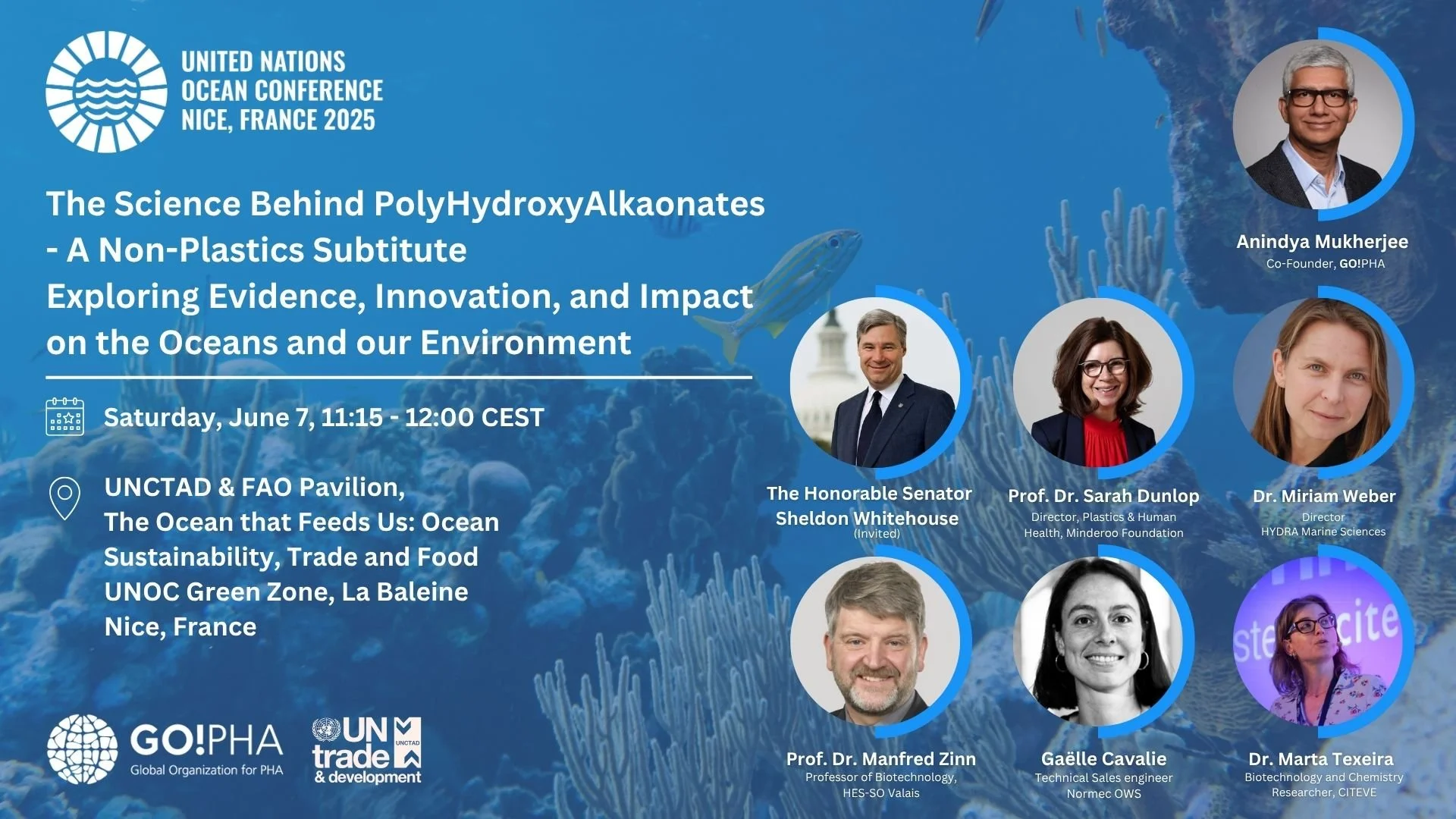2025 UN Ocean Conference (UNOC3)
At the 2025 United Nations Ocean Conference (UNOC3), together with UNCTAD, GO!PHA brings the science and practice of sustainable, non-plastic materials into the spotlight—anchored in its mission to support viable substitutes to fossil-based plastics that are safe for people and planet. This aligns directly with UNCTAD’s call in the ‘Leaving the Shore - Marine-based substitutes and alternatives to plastics’ report for a science-driven transition to marine-based substitutes and its 12th recommendation at UNOC3: the establishment of a technical advisory body to assess sustainable biomaterials from origin to end-of-life. As the report notes, “The alarming global issue of plastics pollution has created a pressing case for natural and environmentally friendly substitutes and alternatives to plastics” - download ‘leaving the shore’
The science behind PolyHydroxyAlkanoates - A non-plastic substitute
Exploring evidence, innovation, and impact on the oceans and our environment
This panel offers a deep dive into the scientific background of PHA, drawing on cross-sector expertise in marine science, human health, biotechnology, and environmental safety. As plastic pollution and microplastic accumulation continue to threaten ocean and human health, PHA represent a promising, bio-based alternative—engineered to perform like conventional plastics but designed to degrade naturally without toxic residues. Speakers will explore the full lifecycle of PHA materials, including their origins from renewable feedstocks, their functional properties, biocompatibility, and circular end-of-life options such as industrial composting and biodegradation in marine environments. The session reinforces the need for a global, science-based assessment framework and proposes establishing a UN Science Task Force to guide innovation and regulation of non-plastic substitutes.
Featured Speakers:
- Anindya Mukherjee, Co-founder GO!PHA - dowload presentation
- The Honorable Senator Sheldon Whitehouse
- Prof. Dr. Sarah Dunlop, Director, Plastic & Human Health, Minderoo Foundation
- Dr. Miriam Weber, Director, HYDRA Marine Sciences
- Prof. Dr. Manfred Zinn, Professor of Biotechnology HES-SO Valais-Wallis - download presentation
- Dr. Marta Teixeira, Biotechnology and Chemistry Researcher, CITEVE - download presentation
- Gaëlle Cavalie, Technical Sales Engineer, Normec OWS - download presentation
Scalable and Competitive Non-Plastic Substitutes - From Innovation to Adoption and Use Cases
Translating sustainable innovation into real-world adoption is critical to shifting away from conventional plastics. This panel focuses on the practical scalability, market readiness, and commercial applications of PHA-based materials. Industry leaders and innovators will present use cases spanning intentionally nature-bound products, products with high change of littering, packaging, nonwovens, and consumer goods, demonstrating how PHAs are already being integrated into global supply chains. Panelists addressed key challenges including cost-competitiveness, regulatory pathways, and infrastructure for collection and composting. The session highlights the importance of collaboration between science, industry, and policy to create the conditions necessary for broad adoption of sustainable, high-performance materials.
Featured Speakers:
- Rick Passenier, Co-founder GO!PHA - download presentation
- Dr. Bryan Haynes, Technical Director in Global Nonwovens, Kimberly-Clark Corporation - download presentation
- Dr. Erwin Lepoudre, Sustainability and Regulatory Affairs Manager, Kaneka Green Planet® - download presentation
- Dr. Geoff Nobes, Director, Business Development, RWDC Industries - download presentation
- Thijs Rodenburg, CEO, Rodenburg Biopolymers - download presentation
- Gaëlle Cavalie, Technical Sales Engineer, Normec OWS
UNOC3 highlights
GO!PHA Key recommendations
GO!PHA key recommendations at UNOC3 in advance of the UN Treaty on Plastics INC5.2
#1 Recognize Biobased Non-Plastic Substitutes as separate from Traditional Plastics
Non-plastic substitutes like PHA, verified by FDA and REACH, offer safe and sustainable-by-design alternatives and should be regulated as part of the solution.
#2 Apply a Criteria-Based Assessment Framework
Apply clear criteria, covering material origin, toxicity, biodegradability, and lifecycle impact, to properly evaluate and classify new materials and prevent misregulation under legacy definitions.
#3 Create a Dedicated Science-Based Task Force for Alternatives & Substitutes to Plastics
Establish a dedicated science task force to evaluate and guide implementation, fill knowledge gaps, and ensure credible integration of suitable, non-plastic substitutes.









